The Online Politics Conference is over and the basic coverage has been excellent. Since I’m late writing these (see yesterday’s post for why) I’m wandering through the two days reflecting on what I saw and heard – so join me.
 Here are some of the great personalities who were part of the Politics Online Conference earlier this week. The woman you see here, Debra Bowen, is the Secretary of State of California. She’s also a savvy Facebook and Twitter user and completely accessible. She speaks plain English about policy, politics and just about everything else, including the changes she hopes to make in California in online electoral reform. Later, she showed up at a panel on the youth vote in jeans, her hair pulled back, no ceremony, no nothing. Keep an eye on her – she’s got a lovely future I think.
Here are some of the great personalities who were part of the Politics Online Conference earlier this week. The woman you see here, Debra Bowen, is the Secretary of State of California. She’s also a savvy Facebook and Twitter user and completely accessible. She speaks plain English about policy, politics and just about everything else, including the changes she hopes to make in California in online electoral reform. Later, she showed up at a panel on the youth vote in jeans, her hair pulled back, no ceremony, no nothing. Keep an eye on her – she’s got a lovely future I think.

This is Jeremy Bird, Harvard Divinity Grad and Deputy Director of Organizing for America – the successor to the Obama online campaign. Shrewd, funny and knowledgeable, he echoed something we heard from all the Obama people at the conference: integrate online into every aspect and every major meeting of the campaign. They need to be a seamless part of the team, not stuck in the basement. Keep everyone in the loop and they take ownership. “I”f you don’t know what it’s like on the ground, you will fail.”

These two guys, Larry Irving and Mike McCurry, were part of a broadband panel. Irving ran NTIA in the Clinton Administration; McCurry, of course, was Bill Clinton’s White House Press Secretary and left with his integrity intact. “Broadband and access to broadband is an indispensable tool for every American” says McCurry. The panel basically made a case for broadband as a tool for health care, education, economic advancement and more. It’s not just cool to get Hulu, it’s critical to our growth, the panelists maintain. It can also save considerable money, particularly in health care, by making the best experts available, remotely, to any doctor anywhere.

Things weren’t all nuts and bolts though. One panel, probably, along with a riveting exploration of the youth vote, was my favorite. It’s title: The Visual Frontier: How the Arts, Pop Culture and Business Innovates the Way We Consume and Use Information. So whose eyes are those to the left? They belong to Josh Klein, a “hacker” and wise man of technology. He and the others in this panel have a combination of wisdom, originality and articulateness that made this panel a real pleasure.
 Probably the other really intellectually exciting panel was How Are We Changing Because of What We Do Online? Its star: Judith Donath of the wonderful MIT Media Lab. Here’s a bit of what she said:
Probably the other really intellectually exciting panel was How Are We Changing Because of What We Do Online? Its star: Judith Donath of the wonderful MIT Media Lab. Here’s a bit of what she said:
The information world is making many things no longer ephemeral the way they once were. We used to be a country of constant reinvention (You could move to the west, change your name, and start over.) We’d move around, and if finished college more than five years ago, we lost our old friends and reinvented ourselves. Now that’s coming to an end. Things written on Usenet years ago comes back to haunt us.
Now our online identity is our most long term and long lasting in the world we are building around us. All that we’ve clicked on is retained somewhere along with shopping records and more. What do we do with the vast amount of the past trailing us around, and how does it affect how we see politicians and each other?
So. Plenty to think about from this gifted and influential group – politicians and “big thinkers” alike.
